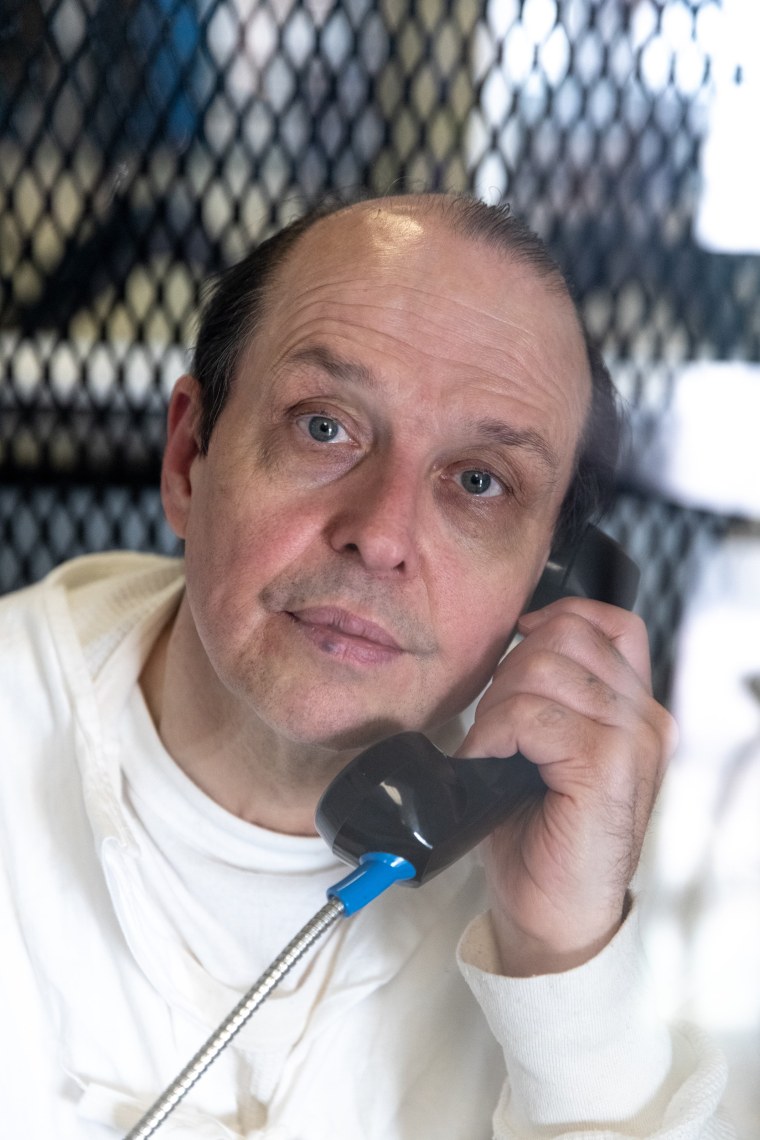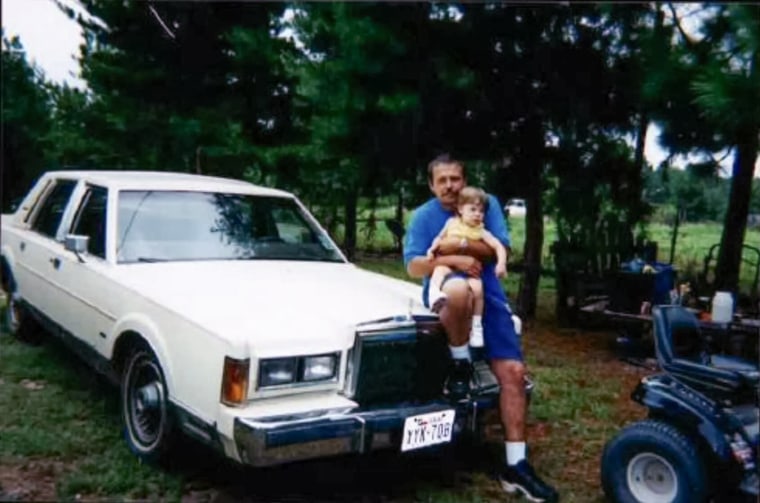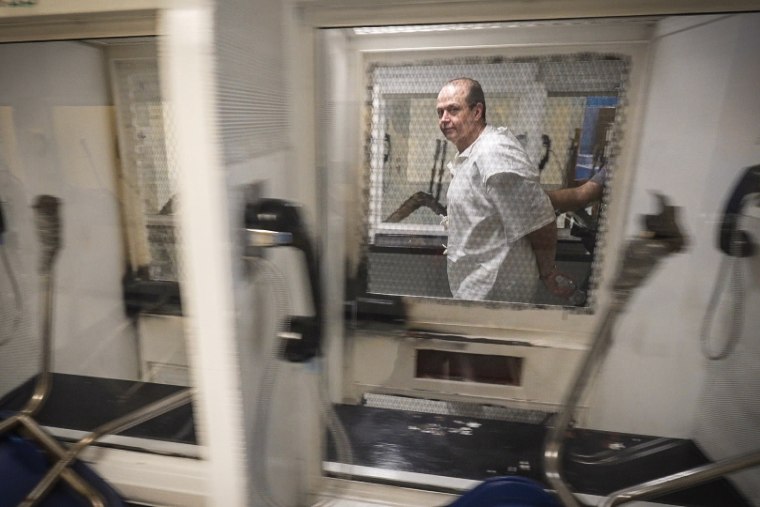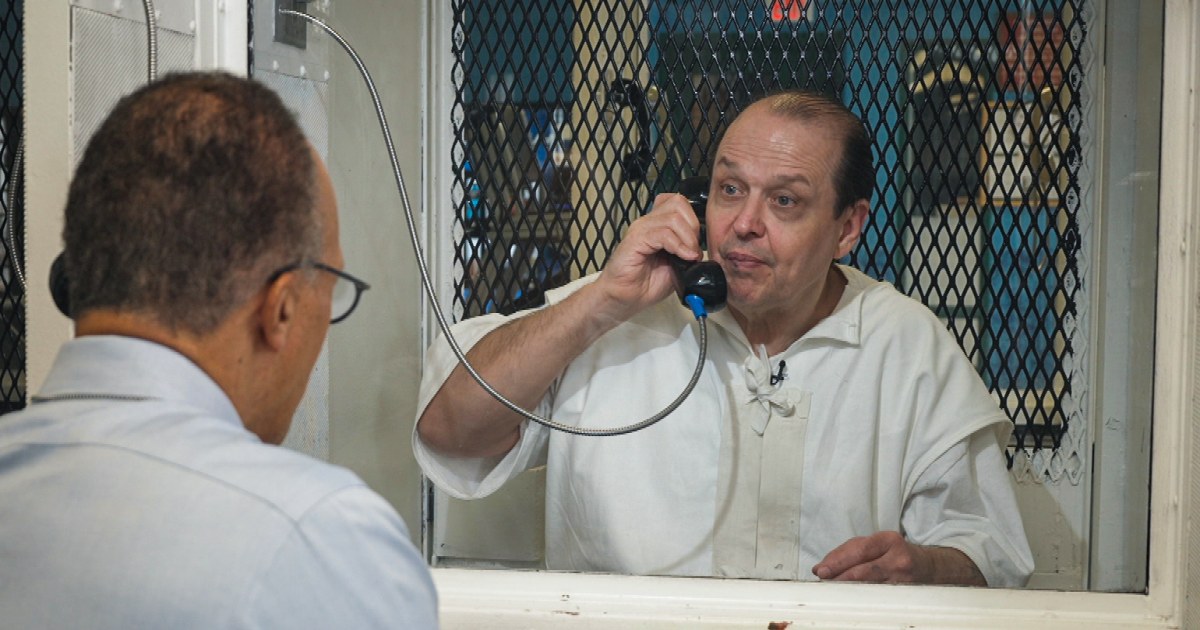The Texas Supreme Court late Thursday halted the execution of a man who was set to be the nation’s first person to be executed for a “shaken baby” death after a day of legal maneuvers.
Robert Roberson, 57, has maintained his innocence after his 2-year-old daughter, Nikki, died in 2002. He had been scheduled to die by lethal injection at 6 p.m. local time at the Texas State Penitentiary at Huntsville. The state’s death warrant expired at midnight.
Shortly before 10 p.m. local time, the Supreme Court issued a stay, or temporary halt, after a bipartisan coalition of state lawmakers issued a subpoena for Roberson to testify at a hearing next week about his case — which he cannot do if he is dead, the high court noted.
A lower court issued a temporary restraining order halting the execution, an appeals court overturned that order, and lawmakers then appealed to the state Supreme Court, which issued the stay.
The length of the stay was not specified, but Supreme Court Justice Evan Young wrote in the opinion that the lower court should act swiftly. “The district court should proceed to the underlying merits with maximum expedition, subject to this Court’s review,” he wrote.
Amanda Hernandez, director of communications with the Texas Department of Criminal Justice, told reporters that Roberson “was shocked, to say the least. He praised God and thanked his supporters.”
Hernandez said that Roberson was returned to his unit and that she did not have a timeline for what happens next. “He did receive a stay for tonight. What happens after that, we’ll have to see,” she said.
Legal efforts
The high court order comes after a day of legal attempts to stay the execution.
With only hours to spare, Judge Jessica Mangrum in Travis County granted a temporary injunction in favor of state lawmakers who took the unusual step late Wednesday of issuing a subpoena for Roberson to testify at a hearing next week about his case — a move meant to obstruct Thursday’s execution.
The attorney general’s office, however, quickly appealed the order to the state’s highest criminal court and won. That then prompted the lawmakers to petition the Texas Supreme Court to stop the execution.
Gov. Greg Abbott could have granted a request by Roberson’s legal team for a 30-day reprieve, but he has not done so.

Earlier Thursday, the U.S. Supreme Court denied a bid to stay Roberson’s execution.
Justice Sonia Sotomayor wrote in a statement that she respected the denial because the appeal had no basis in a federal claim, essentially leaving it to the governor to decide. But in a show of support, she wrote, “Few cases more urgently call for such a remedy than one where the accused has made a serious showing of actual innocence, as Roberson has here.”
On Wednesday, the Texas Board of Pardons and Paroles unanimously declined Wednesday to recommend clemency for Abbott, who has the authority to commute death sentences. The board did not immediately explain why it came to that decision, and Abbott has not shared publicly what, if anything, he might do.
A petition with more than 116,000 signatures asking Abbott to stop the execution was delivered to his office Wednesday.
Roberson’s lawyer, Gretchen Sween, said the case has drawn significant support, including from dozens of distinguished scientists and doctors, a bipartisan group of Texas legislators, advocates for parental rights and organizations that support people with autism.
A Texas House committee held a hearing Wednesday that included testimony from medical experts and a retired lead detective in the case who has since become an advocate for his release.
“This is an innocent man, beyond question,” Brian Wharton, the former detective, told state lawmakers.
In an interview from prison with NBC News anchor Lester Holt this month, Roberson urged Abbott to pardon him because “I’m innocent.”
“Look at the support I’ve got, Mr. Governor, and I’m just hoping, praying that you do the right thing,” he said.
Nikki’s death
Roberson said that early Jan. 31, 2002, he awoke to a “strange cry” in his East Texas home and found Nikki had fallen out of bed. He comforted her, and the family went back to sleep, according to court documents.
But hours later, Roberson said, he woke up and realized Nikki was not breathing and her lips looked blue. He took her to an emergency room, where doctors concluded she was exhibiting signs of brain death. The next day, she was pronounced dead.
Roberson showed little emotion at the hospital, which furthered law enforcement’s suspicions. Within a day, Wharton, a Palestine police detective, arrested Roberson on a capital murder charge.
Wharton testified against Roberson at his trial. Prosecutors highlighted that they believed Roberson intentionally shook Nikki, causing bruising and blunt force trauma, and that he appeared almost emotionless when he took her to the hospital.

Roberson has attributed his “seemingly blank reaction” to autism spectrum disorder, which he was diagnosed with in 2018. In addition, his defense lawyers were not allowed at his trial to have a medical expert testify about his claims of “mental lapses” caused by a brain injury.
The jury also never heard the extent of how sick Nikki was from the day she was born, nor that she had been to the hospital more than 40 times in her short life. Two days before she died, she registered a 104.5-degree fever at the doctor’s office. She was sent home with a medication that has since been deemed too dangerous for children — a drug that now carries a “black box warning” from the Food and Drug Administration.
‘Shaken baby syndrome’
Roberson has steadfastly asserted his innocence in his daughter’s death after doctors, and law enforcement quickly decided she was killed as a result of a violent shaking episode.
Prosecutors argued that Nikki must have been shaken to death because she had been diagnosed with “the triad” — a swollen and bleeding brain and retinal hemorrhaging — symptoms once believed to be indisputable evidence of shaken baby syndrome.
However, since Roberson’s conviction in 2003, the science behind the triad’s being the sole diagnosis of abuse has come under intense scrutiny.
In 2009, the American Academy of Pediatrics changed the name of shaken baby syndrome to the more broadly defined “abusive head trauma” to include injuries caused by mechanisms other than shaking alone.
It is now medical consensus that other medical conditions, including infections, accidental trauma and pre-existing illnesses, can also cause the symptoms associated with shaken baby syndrome.
Hundreds of possible shaken baby and abusive head trauma cases are reported to hospitals in the U.S. every year, according to a nonprofit advocacy group.
While there have been criminal cases involving such injuries, leading to convictions, scrutiny of the medical testimony has also resulted in reversals.
Since 1992, at least 34 defendants were later exonerated in connection with allegations of shaken baby syndrome or abusive head trauma, according to the National Registry of Exonerations, which tracks sentences for wrongful convictions.

‘Junk science’ law
Texas nearly executed Roberson in 2016, but halted it days before so another evidentiary hearing could be held. Ultimately, his bid for a new trial was rejected last year.
Anderson County prosecutors continue to insist in court filings that Nikki was murdered and Roberson is to blame, arguing that his defense “has raised the same tired issues that this court and others have already litigated in the last habeas proceedings including junk science, disease process and actual innocence. All of which have been rejected.”
In 2013, Texas passed a “junk science” law that gives inmates avenues to challenge convictions based on advances in forensic science or other changes not available at the time.
That law — and whether it is being applied properly — will be part of the House hearing Monday at which Roberson is expected to testify, Texas state Reps. Lacey Hull, a Republican, and John Bucy, a Democrat, said after Thursday’s execution was stayed.
“It’s bigger than him,” Bucy said. He and Hull said they believe that Roberson is innocent.
Bucy did not know if Roberson will appear in person or remotely before lawmakers. He said there are still options in the case.
“There is still many people that have the ability to take action in this case, from the governor, to the courts, to the parole board,” he said.

